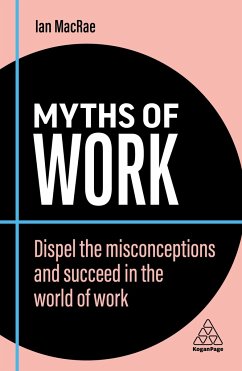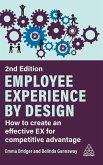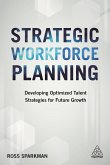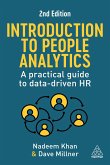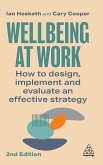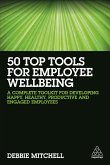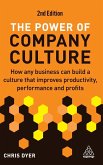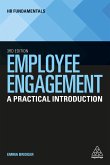- Gebundenes Buch
- Merkliste
- Auf die Merkliste
- Bewerten Bewerten
- Teilen
- Produkt teilen
- Produkterinnerung
- Produkterinnerung
Tackle and debunk the most pervasive myths about work and the workplace to help you get the most out of your career and organization.
Andere Kunden interessierten sich auch für
![Employee Experience by Design Employee Experience by Design]() Emma BridgerEmployee Experience by Design114,99 €
Emma BridgerEmployee Experience by Design114,99 €![Strategic Workforce Planning Strategic Workforce Planning]() Ross SparkmanStrategic Workforce Planning114,99 €
Ross SparkmanStrategic Workforce Planning114,99 €![Introduction to People Analytics Introduction to People Analytics]() Nadeem KhanIntroduction to People Analytics161,99 €
Nadeem KhanIntroduction to People Analytics161,99 €![Wellbeing at Work Wellbeing at Work]() Ian HeskethWellbeing at Work113,99 €
Ian HeskethWellbeing at Work113,99 €![50 Top Tools for Employee Wellbeing 50 Top Tools for Employee Wellbeing]() Debbie Mitchell50 Top Tools for Employee Wellbeing114,99 €
Debbie Mitchell50 Top Tools for Employee Wellbeing114,99 €![Power of Company Culture Power of Company Culture]() Chris DyerPower of Company Culture95,99 €
Chris DyerPower of Company Culture95,99 €![Employee Engagement Employee Engagement]() Emma BridgerEmployee Engagement80,99 €
Emma BridgerEmployee Engagement80,99 €-
-
-
Tackle and debunk the most pervasive myths about work and the workplace to help you get the most out of your career and organization.
Hinweis: Dieser Artikel kann nur an eine deutsche Lieferadresse ausgeliefert werden.
Hinweis: Dieser Artikel kann nur an eine deutsche Lieferadresse ausgeliefert werden.
Produktdetails
- Produktdetails
- Verlag: Kogan Page
- Seitenzahl: 248
- Erscheinungstermin: 25. Oktober 2022
- Englisch
- Abmessung: 209mm x 132mm x 20mm
- Gewicht: 490g
- ISBN-13: 9781398608603
- ISBN-10: 1398608602
- Artikelnr.: 63429548
- Herstellerkennzeichnung
- Libri GmbH
- Europaallee 1
- 36244 Bad Hersfeld
- gpsr@libri.de
- Verlag: Kogan Page
- Seitenzahl: 248
- Erscheinungstermin: 25. Oktober 2022
- Englisch
- Abmessung: 209mm x 132mm x 20mm
- Gewicht: 490g
- ISBN-13: 9781398608603
- ISBN-10: 1398608602
- Artikelnr.: 63429548
- Herstellerkennzeichnung
- Libri GmbH
- Europaallee 1
- 36244 Bad Hersfeld
- gpsr@libri.de
Ian MacRae is a work psychologist, consultant, speaker, author and Managing Director of High Potential Psychology. He works with, and writes about, a wide range of topics relating to psychology and the workplace. He developed the High Potential Traits Inventory (HPTI), a personality assessment which has been translated into dozens of languages and used by over 50,000 people around the world. He is also the author of Myths of Social Media and co-author of Motivation and Performance.
Chapter
00: Introduction; Chapter
01: Staff should work eight
hour days, Monday to Friday; Chapter
02: Working from home reduces productivity; Chapter
03: Social media should never be used at work; Chapter
04: Listening to music while working is distracting; Chapter
05: Health and safety is the enemy; Chapter
06: Surveillance improves performance; Chapter
07: Creating a Google
style office environment will make staff more innovative; Chapter
08: Mindfulness is the answer to all problems; Chapter
09: Neuroscience is the silver bullet to workplace problems; Chapter
10: Start
ups need a different type of leader to succeed; Chapter
11: It's better to have higher self
esteem at work; Chapter
12: We only use 10 per cent of our brain at work; Chapter
13: Making workplaces sustainable is a burden; Chapter
14: The best way to motivate people is to pay them more; Chapter
15: Employees who work the longest hours are the most valuable people; Chapter
16: People should retire at 65; Chapter
17: Perfectionists make the best employees; Chapter
18: Women aren't as competitive as men at work; Chapter
19: People's personalities can be sorted into categories at work; Chapter
20: Sexuality and gender should be taken into account at work; Chapter
21: Millennials are changing the workplace; Chapter
22: Co
workers should not form romantic relationships; Chapter
23: Teaching and training are the same; Chapter
24: Annual appraisals are the best way to measure performance; Chapter
25: High achievers always make great managers; Chapter
26: A computer is going to take your job; Chapter
27: Open
plan offices are always the best option
00: Introduction; Chapter
01: Staff should work eight
hour days, Monday to Friday; Chapter
02: Working from home reduces productivity; Chapter
03: Social media should never be used at work; Chapter
04: Listening to music while working is distracting; Chapter
05: Health and safety is the enemy; Chapter
06: Surveillance improves performance; Chapter
07: Creating a Google
style office environment will make staff more innovative; Chapter
08: Mindfulness is the answer to all problems; Chapter
09: Neuroscience is the silver bullet to workplace problems; Chapter
10: Start
ups need a different type of leader to succeed; Chapter
11: It's better to have higher self
esteem at work; Chapter
12: We only use 10 per cent of our brain at work; Chapter
13: Making workplaces sustainable is a burden; Chapter
14: The best way to motivate people is to pay them more; Chapter
15: Employees who work the longest hours are the most valuable people; Chapter
16: People should retire at 65; Chapter
17: Perfectionists make the best employees; Chapter
18: Women aren't as competitive as men at work; Chapter
19: People's personalities can be sorted into categories at work; Chapter
20: Sexuality and gender should be taken into account at work; Chapter
21: Millennials are changing the workplace; Chapter
22: Co
workers should not form romantic relationships; Chapter
23: Teaching and training are the same; Chapter
24: Annual appraisals are the best way to measure performance; Chapter
25: High achievers always make great managers; Chapter
26: A computer is going to take your job; Chapter
27: Open
plan offices are always the best option
- Chapter - 00: Introduction;
- Chapter - 01: Staff should work eight-hour days, Monday to Friday;
- Chapter - 02: Working from home reduces productivity;
- Chapter - 03: Social media should never be used at work;
- Chapter - 04: Listening to music while working is distracting;
- Chapter - 05: Health and safety is the enemy;
- Chapter - 06: Surveillance improves performance;
- Chapter - 07: Creating a Google-style office environment will make staff more innovative;
- Chapter - 08: Mindfulness is the answer to all problems;
- Chapter - 09: Neuroscience is the silver bullet to workplace problems;
- Chapter - 10: Start-ups need a different type of leader to succeed;
- Chapter - 11: It's better to have higher self-esteem at work;
- Chapter - 12: We only use 10 per cent of our brain at work;
- Chapter - 13: Making workplaces sustainable is a burden;
- Chapter - 14: The best way to motivate people is to pay them more;
- Chapter - 15: Employees who work the longest hours are the most valuable people;
- Chapter - 16: People should retire at 65;
- Chapter - 17: Perfectionists make the best employees;
- Chapter - 18: Women aren't as competitive as men at work;
- Chapter - 19: People's personalities can be sorted into categories at work;
- Chapter - 20: Sexuality and gender should be taken into account at work;
- Chapter - 21: Millennials are changing the workplace;
- Chapter - 22: Co-workers should not form romantic relationships;
- Chapter - 23: Teaching and training are the same;
- Chapter - 24: Annual appraisals are the best way to measure performance;
- Chapter - 25: High achievers always make great managers;
- Chapter - 26: A computer is going to take your job;
- Chapter - 27: Open-plan offices are always the best option
Chapter
00: Introduction; Chapter
01: Staff should work eight
hour days, Monday to Friday; Chapter
02: Working from home reduces productivity; Chapter
03: Social media should never be used at work; Chapter
04: Listening to music while working is distracting; Chapter
05: Health and safety is the enemy; Chapter
06: Surveillance improves performance; Chapter
07: Creating a Google
style office environment will make staff more innovative; Chapter
08: Mindfulness is the answer to all problems; Chapter
09: Neuroscience is the silver bullet to workplace problems; Chapter
10: Start
ups need a different type of leader to succeed; Chapter
11: It's better to have higher self
esteem at work; Chapter
12: We only use 10 per cent of our brain at work; Chapter
13: Making workplaces sustainable is a burden; Chapter
14: The best way to motivate people is to pay them more; Chapter
15: Employees who work the longest hours are the most valuable people; Chapter
16: People should retire at 65; Chapter
17: Perfectionists make the best employees; Chapter
18: Women aren't as competitive as men at work; Chapter
19: People's personalities can be sorted into categories at work; Chapter
20: Sexuality and gender should be taken into account at work; Chapter
21: Millennials are changing the workplace; Chapter
22: Co
workers should not form romantic relationships; Chapter
23: Teaching and training are the same; Chapter
24: Annual appraisals are the best way to measure performance; Chapter
25: High achievers always make great managers; Chapter
26: A computer is going to take your job; Chapter
27: Open
plan offices are always the best option
00: Introduction; Chapter
01: Staff should work eight
hour days, Monday to Friday; Chapter
02: Working from home reduces productivity; Chapter
03: Social media should never be used at work; Chapter
04: Listening to music while working is distracting; Chapter
05: Health and safety is the enemy; Chapter
06: Surveillance improves performance; Chapter
07: Creating a Google
style office environment will make staff more innovative; Chapter
08: Mindfulness is the answer to all problems; Chapter
09: Neuroscience is the silver bullet to workplace problems; Chapter
10: Start
ups need a different type of leader to succeed; Chapter
11: It's better to have higher self
esteem at work; Chapter
12: We only use 10 per cent of our brain at work; Chapter
13: Making workplaces sustainable is a burden; Chapter
14: The best way to motivate people is to pay them more; Chapter
15: Employees who work the longest hours are the most valuable people; Chapter
16: People should retire at 65; Chapter
17: Perfectionists make the best employees; Chapter
18: Women aren't as competitive as men at work; Chapter
19: People's personalities can be sorted into categories at work; Chapter
20: Sexuality and gender should be taken into account at work; Chapter
21: Millennials are changing the workplace; Chapter
22: Co
workers should not form romantic relationships; Chapter
23: Teaching and training are the same; Chapter
24: Annual appraisals are the best way to measure performance; Chapter
25: High achievers always make great managers; Chapter
26: A computer is going to take your job; Chapter
27: Open
plan offices are always the best option
- Chapter - 00: Introduction;
- Chapter - 01: Staff should work eight-hour days, Monday to Friday;
- Chapter - 02: Working from home reduces productivity;
- Chapter - 03: Social media should never be used at work;
- Chapter - 04: Listening to music while working is distracting;
- Chapter - 05: Health and safety is the enemy;
- Chapter - 06: Surveillance improves performance;
- Chapter - 07: Creating a Google-style office environment will make staff more innovative;
- Chapter - 08: Mindfulness is the answer to all problems;
- Chapter - 09: Neuroscience is the silver bullet to workplace problems;
- Chapter - 10: Start-ups need a different type of leader to succeed;
- Chapter - 11: It's better to have higher self-esteem at work;
- Chapter - 12: We only use 10 per cent of our brain at work;
- Chapter - 13: Making workplaces sustainable is a burden;
- Chapter - 14: The best way to motivate people is to pay them more;
- Chapter - 15: Employees who work the longest hours are the most valuable people;
- Chapter - 16: People should retire at 65;
- Chapter - 17: Perfectionists make the best employees;
- Chapter - 18: Women aren't as competitive as men at work;
- Chapter - 19: People's personalities can be sorted into categories at work;
- Chapter - 20: Sexuality and gender should be taken into account at work;
- Chapter - 21: Millennials are changing the workplace;
- Chapter - 22: Co-workers should not form romantic relationships;
- Chapter - 23: Teaching and training are the same;
- Chapter - 24: Annual appraisals are the best way to measure performance;
- Chapter - 25: High achievers always make great managers;
- Chapter - 26: A computer is going to take your job;
- Chapter - 27: Open-plan offices are always the best option

